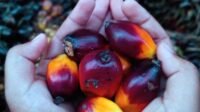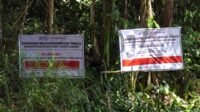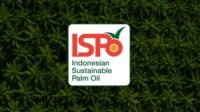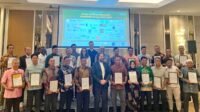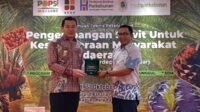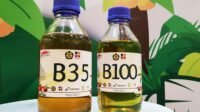PALMOILMAGAZINE, JAKARTA – The Indonesian government has officially issued Presidential Regulation (Perpres) No. 16 of 2025 concerning the Indonesian Sustainable Palm Oil (ISPO) certification system, signed on March 19, 2025. This new regulation replaces the earlier Perpres No. 44 of 2020 and expands its scope to cover the upstream and downstream palm oil sectors, including palm-based bioenergy.
This move reinforces Indonesia’s commitment to strengthening sustainability standards within the palm oil industry, aligning with increasing global demands for compliance with environmental, social, and governance (ESG) principles. A key highlight of the new regulation is the mandatory ISPO certification for independent smallholder farmers, effective four years from its enactment—March 2029.
“This sends a strong message: smallholders must also be part of a sustainable palm oil supply chain. The gap between large companies and small farmers can no longer persist,” stated a representative of the Indonesian Sustainable Palm Oil Farmers Forum (FORTASBI).
Incentives and New Financing Options in the Works
To support the enforcement of the new Perpres, the Ministry of Agriculture is drafting revisions to its Ministerial Regulation (Permentan) that outlines technical implementation. The draft includes several crucial provisions that directly benefit independent smallholders.
One notable proposal is an incentive for ISPO-certified farmers. According to the draft regulation, companies purchasing Fresh Fruit Bunches (FFB) will be required to provide a 4% premium over the government-determined FFB price to certified smallholders.
“This is a form of recognition for farmers adopting sustainable practices. The incentive is expected to motivate others to pursue certification,” said a source from the Ministry of Agriculture.
Moreover, the government is introducing new financing mechanisms to support certification costs. Previously, farmers bore these costs themselves or relied on government budgets. Under the new scheme, smallholder groups can apply for funding through plantation fund management bodies such as the Plantation Fund Management Agency (BPDP).
While FORTASBI welcomed the initiative, the group stressed that the transition requires thorough preparation. The four-year period until 2029, they argued, must be used effectively by all stakeholders to ensure smallholders are truly ready.
“Certification isn’t just about paperwork—it demands a shift in mindset, capacity building, and ongoing technical support. Farmers need training on Good Agricultural Practices (GAP), land legality, and strong institutional support,” FORTASBI stated in a release quoted from their official website on Monday (July 7, 2025).
They also emphasized that ISPO should be viewed as an opportunity, not a burden. Thus, certification must be accompanied by fair incentives and better market access with higher selling prices compared to non-certified products.
“ISPO-certified palm oil reflects farmers’ efforts to uphold environmental and social integrity, as well as sound business practices. There should be added value in the market to keep farmers motivated,” they said.
The government recognizes that successful ISPO implementation among smallholders hinges on human resource development and institutional strengthening at the grassroots level. The four-year transition is designed to enable widespread socialization of ISPO standards and encourage the formation of farmer groups eligible for certification.
On the company side, buyers are also expected to play an active role in supporting their partnered farmers, either through direct partnerships or by complying with the new FFB incentive regulations.
With the enactment of Perpres No. 16/2025, the future of Indonesia’s palm oil industry is envisioned to be more structured, inclusive, and responsible. Independent smallholders—often marginalized in sustainability efforts—are now positioned to play a key role in the nation’s sustainable development goals.
“ISPO is not just a piece of paper. It is a shared commitment to preserve palm oil as a leading commodity that upholds environmental and social justice,” FORTASBI concluded. (P2)







